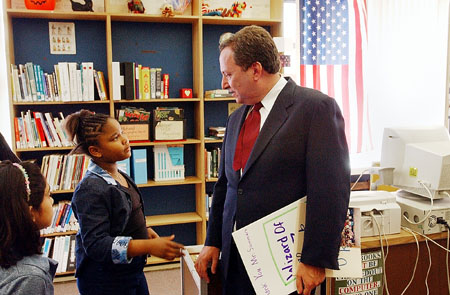Summers donates 750 books to four Cambridge elementary schools

“Un libro te lleva al cualquier sitio que tu quieras“: a book takes you wherever you want to go, 9-year-old Gabriel Castro told Harvard President Lawrence H. Summers on Friday (April 26).
Thanks to Summers’ donation of 187 books to his school, the Amigos School in Cambridge, Castro might never roam any farther than the library.
Castro shared his thoughts at an event to thank Summers for giving 750 books total to four Cambridge elementary school libraries: at the Amigos and Kennedy Schools, the Fletcher-Maynard Academy, the Harrington School, and Martin Luther King and King Open Schools, which hosted the event.
Cambridge Mayor Michael Sullivan and Superintendent of Schools Bobbie D’Alessandro joined students, media specialists, and principals from those schools in expressing their gratitude for the books.
Mayor Sullivan lauded Summers’ gift. “As our kids get to be better readers they will be able to attend the institution that you head. That is something to strive for,” he said.
“In addition to all your distinguished titles, you can add ‘fairy godfather,’” Julia Smith, media specialist at the Fletcher-Maynard Academy, told Summers.
For most of the hourlong event, Summers focused his attention on the youngest members of the audience, who presented him with cards and poems about their love of books. Summers quizzed the students about their reading preferences and encouraged their dreams to study at Harvard.
He recalled the favorite book from his youth – William Pène du Bois’ fantasy-adventure classic “The Twenty-One Balloons” – and acknowledged the importance of teaching, learning, and reading. He drew gasps of horror when he described his own childhood, devoid of computers, VCRs, video games, or cable television.
“The reason it’s different now is that a lot of people – a lot of scientists, a lot of engineers, a lot of people in business – read books, thought about things, thought about how they worked, and look at all the things they came up with,” he told the astonished third- and fourth-graders.
“You can come up with things that will make life much better if you read,” he added.
Crisp new library books, from John Updike poems to “Silly Sally” and “The Star Wars Visual Dictionary,” lined the shelves of the King library. Each media specialist, or librarian, made his or her own selections; at the King, librarian Gary Earl beefed up the library’s picture book collection and bought sought-after reference books.
“There’s always a wish list,” he said, estimating that his recent purchases totaled about $3,000, nearly half his annual acquisitions budget of $7,000.
For Susan Moynihan, media specialist at the Kennedy School (which also houses the Amigos School), the donation nearly doubled her acquisition budget for the year. Like Earl, she chose valuable reference books, but she also splurged on books such as “The Guinness Book of World Records.” “It’s not curriculum-related, but kids love it,” she said.




